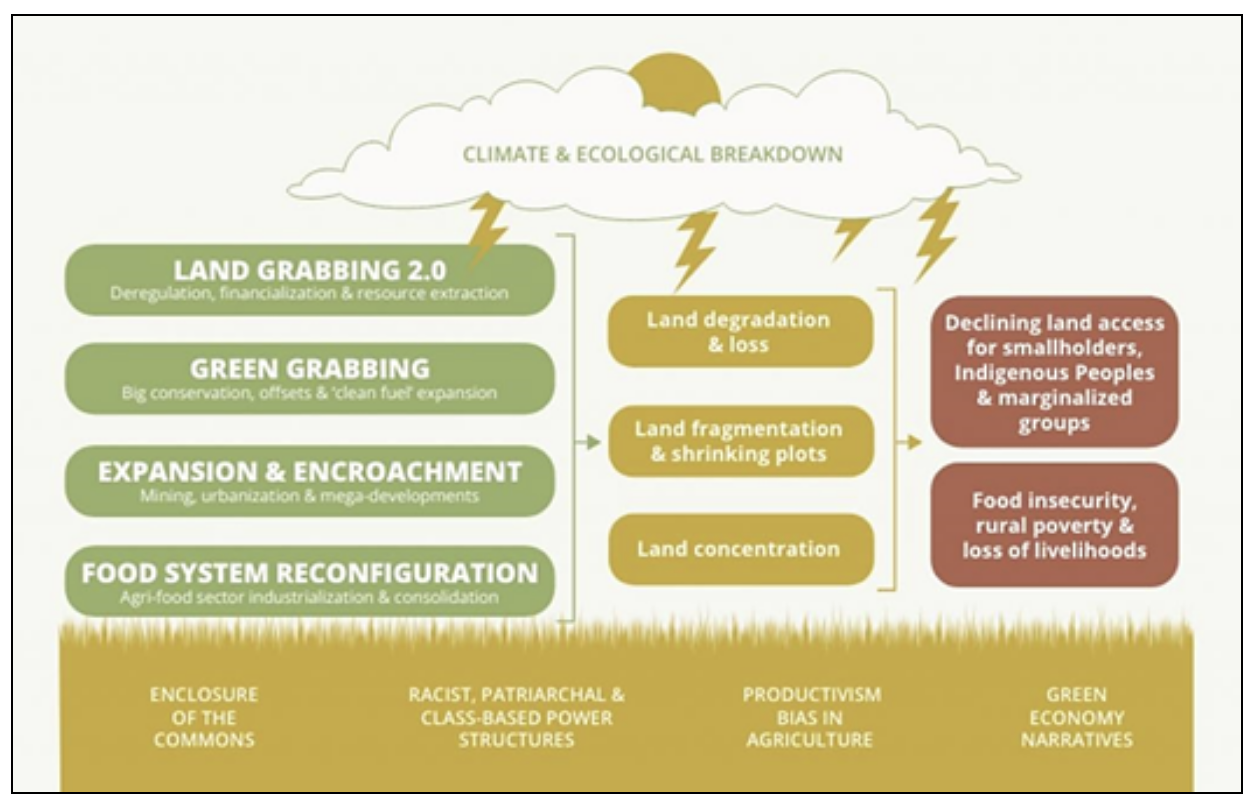News Excerpt:
According to a new report, soaring land prices, land grabs, and carbon schemes are creating an unprecedented ‘land squeeze’, threatening farmers and food production.
|
More about the report:
|
Key highlight of the report:
- The report titled ‘Land squeeze’ exposed the alarming escalation of land grabbing in various forms, opaque financial instruments and speculation, rapid resource extraction and intensive export crop production.
- Major new pressures on land are emerging from ‘green grabs’ for carbon and biodiversity offset projects, conservation initiatives and clean fuels.
- These ‘green grabs’, for which huge swathes of farmland were being acquired by governments and corporations, now account for 20% of large-scale land deals, despite little evidence of climate benefits.
- This global trend of land grabs and green grabs was particularly affecting sub-Saharan Africa and Latin America, while land inequality is growing fastest in central-eastern Europe, North and Latin America and South Asia.

Impact on the farmers and food security:
- Farmers, Peasants and Indigenous Peoples are losing their land (or forced to downsize), while young farmers face significant barriers in accessing land to farm.
- ‘Land squeeze’ is inflaming land inequality and making small and medium-scale food production increasingly unviable – leading to farmer revolts, rural exodus, rural poverty and food insecurity.
- The financialisation and liberalisation of land markets is ruining livelihoods and threatening the right to food.
Impact of government interventions:
- The report pointed out how governments’ pledges for land-based carbon removals alone add up to almost 1.2 billion hectares, equivalent to total global cropland.
- By 2023, carbon offset markets were already valued at $414 billion globally, a figure projected to rise to $1,800 billion by 2030.
India specific findings:
- The report points out that India is a hotspot for land degradation in Asia as its lands face increasing threats of desertification leading to biodiversity loss and groundwater depletion, with detrimental impacts for agricultural productivity and for the lives and livelihoods of pastoralists and other communities.
Important takeaways:
- India’s top 10% own 45% of farm land and 70% of total land is degraded.
- Globally 1% of the world’s largest farms now control 70% of the world’s farmland.
- Since 2000, an area the size of Germany has been acquired through transnational land deals.
- More than half of land grabs are intended for water-intensive crop production, and 87% of land grabs occur in regions of high biodiversity.
- Carbon offset markets i.e. ‘Green grabs’ now account for 20% of large-scale land deals. It is expected to quadruple in the next 7 years.
- Over half of government carbon removal pledges on land risk interfering with small-scale farmers & Indigenous Peoples.
Way Forward:
- It’s time decision-makers stop shirking their responsibility and start to tackle rural decline.
- Instead of opening the floodgates to speculative capital, governments need to take concrete steps to halt bogus ‘green grabs’ and invest in rural development, sustainable farming and community-led conservation.


